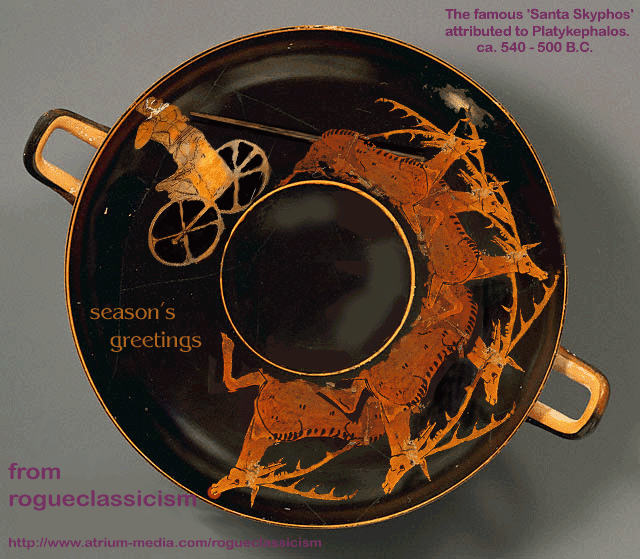Bulletin Board
Classical Employment
Classical Events
Miscellaneous Announcements
Weekly Newsletters
Explorator
The Ancient World on Television (Weekly)
Text Support:

Cartledge: Alexander the Great
Hansen and Nielsen: An Inventory of Archaic and Classical Poleis
Boatwright et al: The Romans. From Village to Empire
Sidebottom: Ancient Warfare. A Very Brief Introduction
Green: From Ikaria to the Stars
Henderson: Hortus. The Roman Book of Gardening
Winkler: Gladiator. Film and History
Barrett: Livia. First Lady of Imperial Rome
|
IN CASE I FORGET ...
::Wednesday, December 24, 2003 8:09:32 AM:: |
|
THIS DAY IN ANCIENT HISTORY ante diem ix kalendas januarias
::Wednesday, December 24, 2003 8:08:06 AM:: |
|
AUDIO: Father Foster The Latin Lover's Christmas program has Father Foster begin talking about some Christmas Cards folks might want to keep the eye open for, but then he gets into translating some phrases associated with Christmas into Latin. Then we get to hear some Latin hymns while Veronica appears to try to stump FF by making him translate some English into Latin. More music (Gregorian Chant et alia) follows ...
::Wednesday, December 24, 2003 8:05:02 AM:: |
|
CHATTER: Debating Point Townhall.com has a piece by Tony Blankley on miscalculations during major military conflicts. In passing he mentions as an exemplum:
Wow ... can we really blame Alcibiades for the outcome of the Peloponnesian War (did he 'overplay his hand'?). I'll have to think about that one ...
::Wednesday, December 24, 2003 7:46:32 AM:: |
|
NUNTII: Christmas and the Colossus Here's a very interesting piece from the Independent, reproduced in its entirety, which suggests the December 25 date for Christmas is tied to the consecration of the Colossus of Rhodes:
::Wednesday, December 24, 2003 7:42:06 AM:: |
|
CHATTER: Equine Caligular Comparanda Journalists are forever bringing up the popular version of the Caligula-and-his-horse story, usually rather ineptly. Today, however, we read of the New Zealand horse Bonecrusher, who is to make his last public appearance:
Source (love the photo!)
::Wednesday, December 24, 2003 7:36:36 AM:: |
|
CHATTER: Socrates, Plutarch, whatever As might be expected, over the past few days there's been a flood of Christmas pieces with their obligatory tip of the pilleus to the ancient world. Here's the incipit of first one that caught my eye -- from a Nigerian newspaper -- I think it speaks for itself:
Looks like someone got a Thesaurus for Christmas ...
::Wednesday, December 24, 2003 7:29:38 AM:: |
|
NUNTII: Latin in the Economist I'm doing a bit of catching up today, posting some things I meant to post on Sunday (during my technical difficulties) and trying to give you enough content to keep you happy for a couple of days when I'll probably be away from the computer. The first is that 'Latin is alive and well' piece from the Economist which I mentioned in "explorator". Here's the incipit:
::Wednesday, December 24, 2003 7:24:48 AM:: |
|
AWOTV: On TV Today 2.00 p.m. |A&E| Helen of Troy (part 2) 4.00 p.m. |HISTU| Jesus of Nazareth, Pt. 1-4 7.00 p.m. |HINT| Guardian of the Ages: The Great Sphinx 9.00 p.m. |HINT| Time Team: Cirencester HINT = History International A&E = Arts and Entertainment HISTU = History Channel (US)
::Wednesday, December 24, 2003 7:11:13 AM:: |
| December 2003 | ||||||
| Sun | Mon | Tue | Wed | Thu | Fri | Sat |
| 1 | 2 | 3 | 4 | 5 | 6 | |
| 7 | 8 | 9 | 10 | 11 | 12 | 13 |
| 14 | 15 | 16 | 17 | 18 | 19 | 20 |
| 21 | 22 | 23 | 24 | 25 | 26 | 27 |
| 28 | 29 | 30 | 31 | |||
| Nov Jan | ||||||
Please help offset our server costs! Your support is greatly appreciated!
BLOGWATCH
About.com
Ancient/Classical History
ARLT
Association for Latin Teaching
Blogographos
Blogging for the Demos
Christian Origins
Kirby's blog and sundry essays about early Christianity
Curculio
The Web Page of Michael Hendry
Campus Mawrtius
Male Graduate Students: Unserious in Terms of Studies Since 1931.
CCC
Classics in Contemporary Culture
Classico e Moderno
L'antichità greca e latina in rapporto alla quotidianità
Hobbyblog
Documenting an ancient coin collection
Hypotyposeis
Sketches in Biblical Studies
Laudator Temporis Acti
Complaints about this and that
Martialis
The Epigrams of Martial
Michael Shanks
rants and ruminations on all things archaeological
NT Gateway
New Testament studies and related material
PaleoJudaica
Ancient Judaism and its context
Philo of Alexandria
Studies of Philo of Alexandria and the Diaspora Judaism of his time
Sauvage Noble
An austronesian's adventures in altertumswissenschaft and indogermanistik
Stoic News
Stoic Philosophy in the 21st Century
The Stoa Consortium
A Blog Without a Tagline
Tradicion Clasica
A Blog dedicated to the Classical Tradition


Fiction:
Pressfield: The Virtues of War. A Novel of Alexander the Great
Saylor: The Judgment of Caesar
Davis: Scandal Takes a Holiday


1. n. an abnormal state or condition resulting from the forced migration from a lengthy Classical education into a profoundly unClassical world; 2. n. a blog about Ancient Greece and Rome compiled by one so afflicted (v. "rogueclassicist"); 3. n. a Classics blog.
Publishing schedule:
Rogueclassicism is updated daily, usually before 7.00 a.m. (Eastern) during the week. Give me a couple of hours to work on my sleep deficit on weekends and holidays, but still expect the page to be updated by 10.00 a.m. at the latest.












